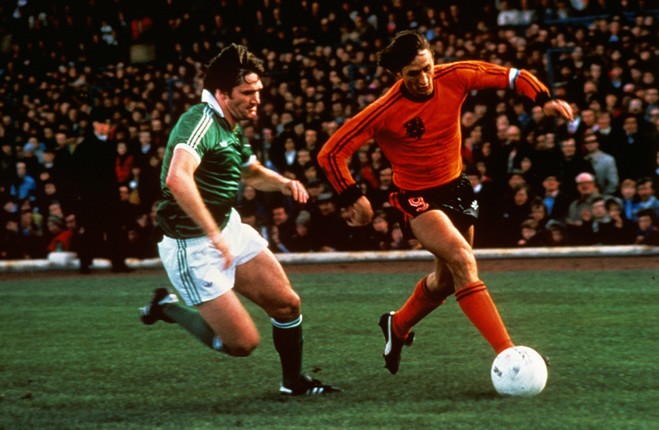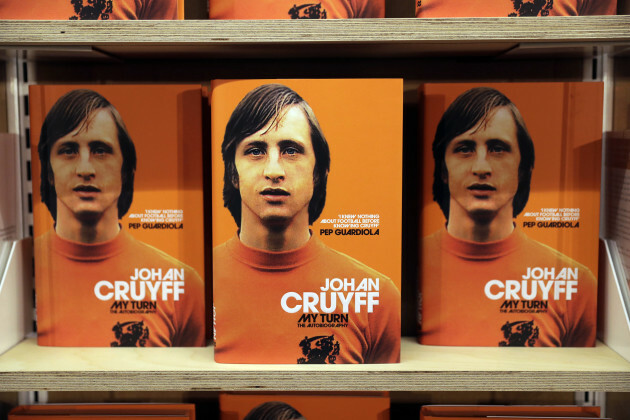THE FOLLOWING PASSAGE is a My Turn: The Autobiography by Johan Cruyff.
In the section below, the late Dutch legend discusses his upbringing and how he acquired his love of football.
Everything I have done has been done with a view to the future, concentrating on progress, which means that the past is not something that I think about too much.
For me, this is completely natural. Details of the matches I have played in have been written about better by other people elsewhere; what I am interested in is the idea of football.
Continually looking forward means that I can concentrate on getting better at whatever I am doing, and I only really look back in order to gauge what I can learn from mistakes.
Those lessons can be taken from different points in your life, and you don’t necessarily see how connected everything is until later. So while I always move forward, I can’t always look at what’s gone before as a straight line.
At the heart of what I have learned as a player is that, above all else, you need four things: good grass, clean changing rooms, players who clean their own boots and tight goal nets.
Everything else – skills and speed, technique and goals, will come later. This is the philosophy that defines my feeling for football and for life.
I’ve translated that into everything I’ve done, whether that is with Total Football on the pitch, with my family or the Cruyff Foundation — it has always been about progress and never ever stopping getting better.
Football has been my life from the beginning. My parents owned a greengrocer’s shop in Betondorp, a few hundred metres away from Ajax’s De Meer Stadion in Amsterdam, so it was inevitable.
My father never missed an Ajax game and, though I may not have inherited my talent from my father, he did pass on his unconditional love for the club. In fact, where my talent for football originates is a mystery.
I clearly didn’t learn it from my father or grandfather, as I never saw them play themselves. My uncle, Gerrit Draaijer, my mother’s brother, did play a few matches at outside left for Ajax’s first team, but that was in the 1950s, when Ajax were not one of Europe’s well-known sides.
My father told me about players like Alfredo Di Stéfano, who understood everything about how to use space on the pitch, as well as Faas Wilkes, who was a phenomenal dribbler of the ball. He would start in midfield and dribble past four or five people. Incredible.
Wilkes played for Xerxes Rotterdam, before going to Inter Milan, Torino and Valencia, returning to Holland later in his career. That was when I realised what a Dutch man could achieve on the pitch. But we didn’t have a TV and didn’t see many foreign teams, so for most of his career I could only watch him occasionally.
As for Di Stéfano, it was not until 1962, when he came to Amsterdam with Real Madrid for the European Cup final, that I was able to see him with my own eyes.
Everything for me started in the street. The area where I lived was nicknamed the ‘Concrete Village’, an experiment in building cheap housing after the First World War. It was working class, and as kids we spent as much time out of the house as possible; from as early as I can remember we played football everywhere we could. It was here I learned to think about how to turn a disadvantage into an advantage.
You see that the kerb isn’t actually an obstacle, but that you can turn it into a teammate for a one–two. So thanks to the kerb I was able to work on my technique. When the ball bounces off different surfaces at odd angles, you have to adjust in an instant.
Throughout my career people would often be surprised that I shot or passed from an angle they weren’t expecting, but that’s because of how I grew up.
The same thing is true of balancing. When you fall on the concrete, it hurts, and, of course, you don’t want to get hurt. So when playing football, you’re also busy trying not to fall.
It was learning to play like this, when you had to react to the situation all the time, that taught me my skills as a footballer. That’s why I’m a great advocate of making young people play football without studs. They miss the hours I had in the street, the hours practising how not to fall. Give them flat soles and help them keep their balance better.
At home, life was pretty basic, but I didn’t care. I grew up in a warm family home. I slept in the same room as my brother Hennie, who is two and a half years older than me. When you’re very young that’s a big difference. But I was out playing football as often as I could, so he had his own life and so did I.
I’m very much a mixture of my parents. I get my social side from my mother, my cunning from my father, because I’m definitely cunning. I’m always on the lookout for the best advantage, just like my father, Manus.
My father was a joker. He had a glass eye and bet people five cents to see who could stare into the sun for longest. He would put his hand on his good eye, look at the sun for a minute and pick up his money.
My mother, Nel, was very sociable. For her, everything revolved around the family. She had nine brothers and sisters, so in addition to nine uncles and aunts, I also had dozens of cousins.
The great thing was that if anything bad happened there was always someone who could help you. One of them knew about heating stoves, another was good at drawing, so there was always someone whose door you could knock on if there was a problem.
But when it came to football, I was on my own — the interest in it I had seemed to have passed them all by.
My Turn: The Autobiography by Johan Cruyff is published by Macmillan. More info here.
The42 is on Instagram! Tap the button below on your phone to follow us!

